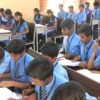Kolkata traffic cop provides free education to over 100 tribal children
A traffic constable in Kolkata, Arup Mukherjee provides free education and rehabilitation to more than 100 tribal children in the state. At 43, when Mukherjee is not managing traffic, he is busy pursuing his mission to rehabilitate children belonging to the Sabar tribe community, considered the poorest section.
Barely at the age of 6, he made a promise to himself at the behest of his grandfather that when he grows up, he would save money and open a school, some day.
He joined Kolkata police in 1999 and started saving immediately.
Known as ‘Sabar Pita’ (Sabar’s father) in the region, his mission is to educate children from the Sabar tribe which arose from his childhood experience of seeing policemen frequently dragging the poor, helpless people of the community for one crime or another.
He convinces the parents to send their daughters and sons to a boarding school that he has set up in Barabazar block in Purulia district.
Mukherjee’s school – Puncha Nabadisha Model School, became a reality in 2011. It offers about 126 Sabar children food and basic education free of cost. The initial fund of Rs 2.5 lakh for the school in Puncha village, around 280 km from Kolkata, was from his savings. Mukherjee took a bank loan of Rs 1 lakh and Rs 50,000 from his mother to build five rooms with asbestos roof on a plot donated by a friend of his father.
The children are aged between 4 and 15 years.
“I saw them being ostracised, and not given jobs. They took to crime. My grandfather would tell me that the Sabars were not educated, and so were unable to find jobs. When I persisted with my grandpa what I could do for them, he told me to grow up and start earning and then think of something for the poor Sabar children. I set my goal, then,” says Mukherjee.
“I would tell them to send their children to study for the sake of their future. That struck a chord with the community,” he said.
Around 20,000 members of the Sabar tribe live in five blocks of Purulia district. After that, schooling continues in the secondary and high schools in the area. “I use Rs 20,000 of my salary for the school. We have farmlands which help me run my family,” says Mukherjee. “Many poor Sabar parents came to me with a request to include their children in my boarding school because they were unable to feed them,” he added.
“My superiors are aware of my school. I faced departmental proceedings on two occasions for going on leave to visit the distressed children. It would have been better had I been transferred to my area. Whenever I come to know that the children need me, I can’t stay in Kolkata,” he says.
Source: The New Indian Express
Read: Bell-free school to global citizenship curriculum: National award winning teachers’ innovative ideas
Also read: Kerala schools becomes first state to go completely digital in public education

















Add comment